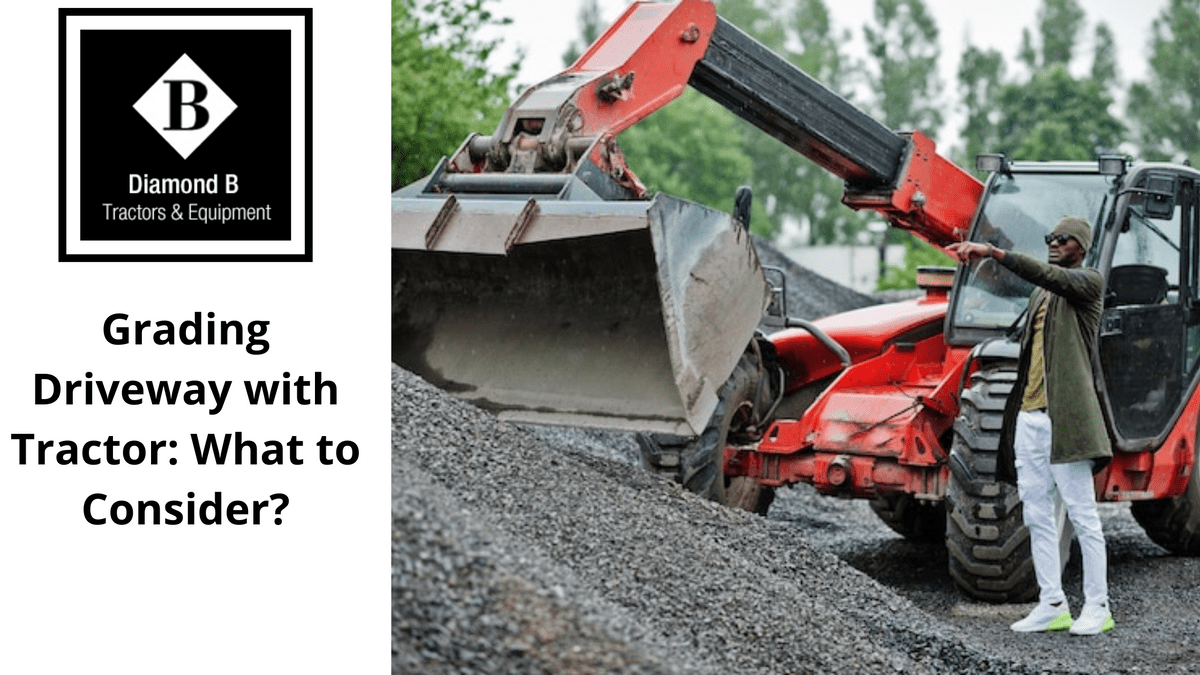
Introduction:
If you have a large property, you have a long driveway. While a long driveway may be convenient, it also means more work regarding upkeep. One of the most important aspects of keeping your driveway in good condition is making sure it is properly graded.
There are a few different ways to grade your driveway, but one of the most efficient ways is grading with a tractor. If you're considering using a tractor to grade your driveway, there are a few things you'll need to keep in mind. This article will discuss critical considerations before using a tractor to grade your driveway.
What Is the Condition of Your Driveway?
One of the first things you'll need to consider when grading your driveway with a tractor is the pavement condition. If your driveway is in good condition, grading it with a tractor should be relatively easy. However, if your driveway is in poor condition, you may need to put more effort into the process.
If your driveway is in poor condition, you may need to repair any cracks or potholes before you begin grading. Otherwise, you run the risk of damaging your tractor. If you're unsure how to repair your driveway, we recommend hiring a professional.
What Type of Tractor Do You Have?
Another important consideration is the type of tractor you have. Different types of tractors are better suited for different kinds of projects. For example, if you have a lawn tractor, it likely won't be powerful enough to grade a long driveway. On the other hand, if you have a farm tractor, it will be more than capable of handling the task.
When choosing a tractor for sale to accomplish your grading project, consider the size of your driveway and the pavement condition. Doing so will help you choose the right tractor for the job.
How Much Does It Cost?
Of course, one of the most important considerations is cost. Grading a driveway with a tractor can be costly, so you'll need to ensure you're prepared for the expense. The driveway grading cost will vary depending on your property's size and the pavement condition.
If you're concerned about the cost of grading your driveway, we recommend getting quotes from multiple contractors. This will help you get an accurate estimate of the project's cost.
How to Grade a Driveway?
Compaction:
When we drive vehicles and equipment along the same path over and over, the soil beneath our tires gets packed down. This is called compaction. And while some degree of compaction is necessary to support the weight of our vehicles, too much compaction can be problematic. Compaction occurs due to the weight of the vehicle or equipment and the number of times the wheels travel over the same path. When compacted, soil particles are squeezed together, and the air is pushed out. This can cause drainage and root growth problems and make it more difficult for seeds to germinate.
To avoid this, start filling the ruts with loose soil, then use a disk harrow to break up the compacted soil. Finally, use a roller to compact the loose soil.
Crowning:
When grading your driveway, it's important to create a crown. A crown is an elevated area in the center of the driveway that helps promote drainage. Without a crown, water will pool on your driveway and cause damage.
To create a crown, you'll need to grade the sides of your driveway slightly higher than the center. This will help ensure that water drains properly and doesn't pool on your driveway.
Erosion:
Another common problem with dirt roads is erosion. Erosion occurs when rainwater or melting snow washes away the top layer of soil. This can create ruts and gullies and make driving more challenging on the road.
Start by grading the road to slope away from the center to prevent erosion. This will help water runoff flow off to the sides of the road. You can also add culverts or drainage ditches to improve drainage further. Finally, consider using a gravel layer to help protect the road from erosion.
Potholes:
Potholes are another common problem on dirt roads. Potholes form when water seeps into the road's cracks and freezes. This expansion causes the cracks to become larger and eventually leads to potholes.
To avoid potholes, regularly check the road for cracks and repair them as needed. You can also seal the cracks with asphalt sealant to help prevent water from seeping in.
The Bottom Line:
Grading your driveway with a tractor is a great way to improve its appearance and function. However, there are a few things you need to consider before getting started. First, choose the right tractor for the job and be prepared for the project's cost. You'll also need measures to prevent common problems like compaction, erosion, and potholes. Following these tips, you'll have a smooth, safe, and functional driveway.
If you're ready to improve your driveway, get a tractor for sale in excellent condition from your nearest dealer and undergo happy grading!
